Crappy Last Minute Drawing Of My Dino-riding-bushranger Sona Thing

crappy last minute drawing of my dino-riding-bushranger sona thing
(Had a lot of fun trying out texture functions on Clip)
@kiki-whentheyart
More Posts from Jcryptid and Others
reblog this if your icon could kill a man




Assorted sketches of my lil’ scruffy wizard man

Someone said "Catboy John Doe" and I just couldn't help myself
After much deliberation and manic procrastinating I now present my official list of favourite charcter archetypes:
Character who does objectively good things and is on the side of good but is still an objectively terrible person
Gruff loner parent who adopts other characters and care about them deeply in their own way and it's really heartwarmingly obvious but they will never actually say it
Absolutely feral rough and tumble fighter who is misunderstood as a troublemaker, gets mad when their friends are hurt and will sacrifice themselves at the drop of a hat but would never admit it
At some point had big protagonist energy but all their friends are dead or gone and are just trying their hardest after getting in over their head but still wanting to do good in the world
Gods who literally couldn't give two shits about your problems and what humans these days are up to
Someone who has escaped a terrible situation and hated the person they were when they were in said situation and is trying to be better but has terrible self-worth and succumbs to the power of friendship™ and a well written recovery arc
Prick "I know more than you" academics who are snarky and absolute smug little shits especially to the antagonists but have a heart of gold
Antagonist that everyone but the person they "work for" knows is the one who's really in charge
Character who can and will easily kill you in 101 ways with their bare hands but will feel bad about it afterwards (bonus points if PTSD and their personality is absolute baby) That one shapeshifter who's just here to have fun, cause some chaos and prank everyone
That one shapeshifter who can transform into one (1) thing and that one thing is an absolutely fucking terrifying beast of some kind when they go Apeshit
Flirty pretty femme boy or girl who probably doesn't care about gender at all so long as they get to look fabulous and tease people they think are cute
A group of 'orphans' who findfamily in each other (feat. Intimidating but objectively good parent who has unofficially adopted everyone, older sibling child trying to take care of everyone, the chaotic dumbass, the innocent bean, the one who's having none of their bullshit, etc.)
Amnesiacs who are just trying to move on with their lives and turn over a new leaf and are honestly terrified of finding out the truth of who they were in the past
Maintaining Scope of Violence in Your Story's World
I saw an interesting discussion in the Baldur's Gate 3 subreddit, commenting how a player's immersion was broken when a version of the player character, known as "The Dark Urge", is apparently to blame for a particularly brutal murder and yet the companion characters don't turn on him/her/them immediately. The commenter was baffled given the brutality of the killing. Yet many replies pointed out that other members of the party are also murderers or tapdancing on the edge of committing atrocities, not to mention other mitigating circumstances that it would be spoilers to go into.
This got me thinking about scope of violence in genre fiction and how, on top of all the other difficult jobs the writer has before them, establishing what level of violence is "commonplace" vs "shocking" can be a surprisingly delicate process.
(Cut for length. Includes references to Game of Thrones, House of the Dragon, John Wick, and NBC's Hannibal in an exploration of how to establish the scope and scale of on-screen violence. TW for discussions of violence against children in shows like GoT and HotD, though it is largely in abstract terms.)
I'm reminded of "House of the Dragon" (HotD) which, I must confess, I found to have rather patchy and uneven writing.
One moment in HotD that I found rather dissonant, shall we say, was when a child of the nobility loses his eye in a brawl with other children. His mother, an aristocrat, is understandably horrified and enraged. However, some of the threats she makes to equally powerful Houses over the incident feel, dare I say, disproportionate to the event, given that her threats could lead to the world as she knows it being plunged into civil war, all over what amounts to a tussle between children, albeit one that ends in a particularly gruesome manner.
On the one hand, any modern mother likely would completely freak out at such an appalling injury as a lost eye from a knife fight between children. That would be a major shock to a modern community, where such violence is quite rare. And in fairness, the aristocrats of the world of "Game of Thrones" and HotD by extension are largely insulated by their privilege from the day to day violence we see portrayed in the series. If anyone was realistically going to have a modern response to a child's maiming, it would be the sheltered daughter of a noble house with regards to her beloved child.
However, as understandable as her reaction might be to modern viewers and to those who take into account her sheltered upbringing, in my mind, the show's narrative wobbled there in terms of establishing the level of violence that is considered commonplace in the world of HotD/GoT. In the first season of Game of Thrones, we famously saw a child pushed out of a window, permanently disabled and left in a coma for months, and while this is a major event that creates a great deal of tension and conflict, ultimately the family after their attempts at individual revenge the fact is they can't start a civil war over this single event. So in a way we're sort of left with: this is just a thing that happens that we have to suck up and deal with, even if certain individuals might wish to and continue to pursue a personal vendetta. Couple that with commoner children being murdered and the deaths going completely unremarked upon by wider society, we're left with the impression of a world in which brutality, even brutality against children which would grind a modern community to a halt, is simply an ugly and relatively common part of life. A life with so much ugliness and personal violence that it really almost gets lost amidst all the other horrors.
Which makes the HotD mother's reaction feel... disproportionate. Not in relation to her child's suffering, which is entirely understandable, but her view of what retaliation constitutes a proportional response comes across as hysterical. Too modern. Children are horrifically injured in the GoT/HotD world all the time. Frankly, by comparison, a lost eye is almost minor compared to a loss of mobility in a rigorously martial world, access to which Bran lost with his fall. We don't get as good of a set up of what the conflicting morals of this world are, we don't get the comparison between commoner and noble children as clearly as in GoT, we don't really get all the conflicting views of "When is it normal to start a civil war over a child's injury?" - the sense of scope and scale of violence and how we and the characters are supposed to react to it... wobbles.
Along these lines, I've also pointed out that in shows like NBC's Hannibal, the show is scrupulously careful about not really referencing global events like wars. In my mind, there's a simple reason for that. Your average drone attack on civilians in the Middle East kills more innocent people by accident than Hannibal Lecter has ever killed in his entire murderous career. Compared to weapons of war, one murderous serial killer is barely a rounding error in terms of death and human suffering. So the show has to remain almost claustrophobically intimate so we never get confronted with the "So what?" of the individual death and human suffering Hannibal and the other serial killers bring about on a very close, personal basis. The horror style is meant to force us to imagine ourselves if we were the victims (or the killer) in these incredibly intimate murders. If our suffering was writ large. If every individual death was massively significant. But this is in contrast with real world mass casualty events which would dwarf many times all of the deaths in the Hannibal show combined.
As a final example, the moment the first season of "True Detective" lost me was when the value of a single life also wobbled dramatically. The conceit of the show is that a single murder, or a half dozen at most, murders of young white women is worthy of a major, multi-year investigation. Yet when the investigation inadvertently leads to an outbreak of violence in a predominantly black community, shown almost immediately to kill more people (in front of their children, even) than were lost in the entire murder spree of white women that's being investigated, the show didn't seem to care at all. Individual white female victims were worthy of a breathless investigation into their untimely loss, but twice that number of black people killed in an outbreak of violence directly linked to the investigation didn't even seem worthy of commentary or reflection at all. The value of a single human life was no longer consistent. If these deaths aren't worthy of justice, then why should I care about the few individual deaths being investigated?
As with any measuring of scope in fiction, it's very hard for the author to do alone. It really is an instance where an outside pair of eyes is incredibly valuable.
But things to keep in mind while crafting a narrative around violence is just how much are readers or viewers supposed to be alarmed by individual acts of violence. It's common and indeed necessary for modern media to establish the rules of its world. Even stories nominally set in "our" world actually do almost as much worldbuilding as any fantasy tale in this respect. In a cop drama where each episode is built around a single murder, we need to inhabit a world where a single murder is worthy of dozens of people spending time and resources bringing the killer to justice. In such a world, a mass casualty event of several deaths should be shocking. To this end, like in NBC's Hannibal, it's probably best to avoid mentions of mass casualty events caused by war or natural disasters.
By contrast, an action film like John Wick might place less value on individual deaths (beyond the motivating deaths of a single dog, which is thoroughly commented on within the story as feeling disproportionate and therein lies much of what makes the plot so unique. I'd argue it is also the cutest dog ever born, but I digress). We're not going to see a lurid headline, "John Wick murders 26 local men in cold blood, read about this tragic loss along with quotes by their devastated wives and children on page 6". To a certain extent, the violence there is meant to be just shocking enough to thrill, but we're not meant to get too invested in the details of the actual body count.
And, to go even more extreme, in war or disaster movies, we see or have narrated that thousands have died at a time. Again, to go back to Game of Thrones/House of the Dragon, one reason it's hard to see the mother's reaction to her child's maiming as anything but a bit disproportionate is because we see with such brutality hundreds if not thousands of men, women, and children dying directly or indirectly as a result of war. While it's understandable that a mother would burn the world down for an injury to her child, we're not well placed to agree with or sympathize with her reactions on the broader scale, in terms of retribution that would lead to war, against a backdrop of brutal mass casualty events in the thousands where even more families are devastated and more children injured or killed.
As a final, positive word on the Game of Thrones universe, the early seasons of the GoT were actually very good at controlling the audience's reaction to the scope of violence. Namely, the Battle of the Blackwater sticks out in my mind. The world of GoT is so grounded in the mud, in ugly, personal but intimate violence done with hands or blades, otherwise rudimentary weapons, that the first time we see an explosion on a near-modern scale feels as genuinely breathtaking to modern eyes as it might have to the Medieval-eseque eyes of that world. Yet there are movies chock-full of explosions where the explosions lose impact and importance, become background noise, because they're simply one of many. By rigorously tamping down and limiting the scope and type of violence to largely hand to hand combat, Game of Thrones set up a moment where modern warfare-style explosions are awe-inspiring. Against that backdrop, the appearance of fire-breathing dragons on the battlefield is also arresting, though their capabilities would likely be dwarfed by a modern fighter jet and many viewers of GoT would be familiar with films where the scope and scale of violence is much bigger and more explosive. It feels big in GoT because the scope and scale has been so small to that point.
Once you as a writer have established the modernity of your violence, the scope and scale of it, the average body count, the importance of a single human life, it's important to stick to it. If a character has a differing view, then they should be noted as having it by the narrative. A grizzled war veteran might shrug at a small town murder investigation of a single individual, but a sleepy town might lose its mind over it. In the modern world, the lives of children are put on the highest pedestal, but once you establish in your world that some children's lives are of lower value, then showing a mother act with an understandable modern sensibility of horror and outrage still needs to be commented on so we understand where her reaction falls within her society, especially if it's in contrast. That is what teaches us how to watch and appreciate the narrative choices as they're meant to be appreciated.

Decided to draw my take on a human John Doe (and he’s chibi because I said so >:3)
This is 5 days too late, but I felt like re-drawing my half-thrown together Halloween costume because I really needed an excuse to draw something spoopy.

Can you tell I love old timey ghost stories?

it rules to be a transgender writer because writing trans themes is easy as fuck. it's easy as fuck dude. trans themes basically write themselves. change is the fundamental motor of storytelling. guess what else is all about change bitch


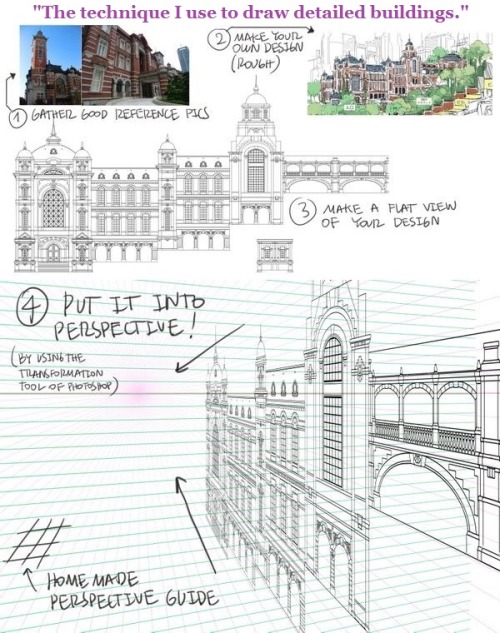
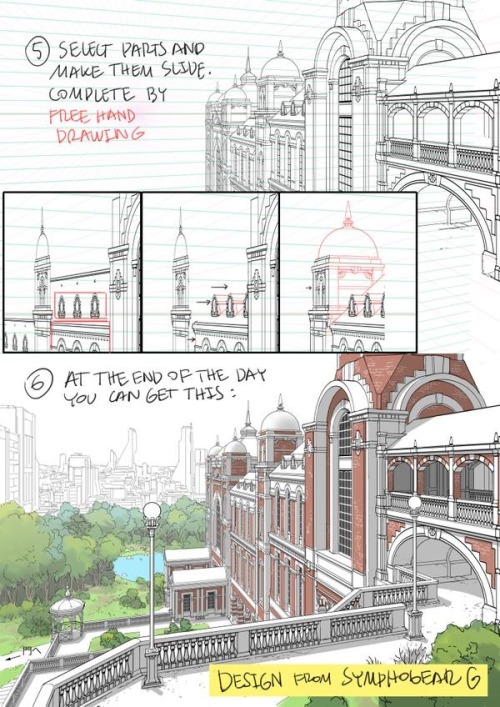




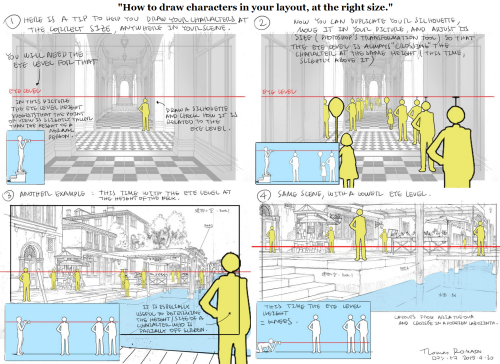
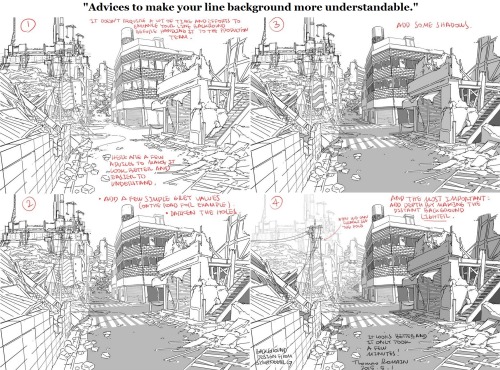
A master post of Thomas Romain’s art tutorials.
There’s not enough space to post all of them, SO here’s links to everything he has posted (on twitter) so far : 1 2 3 4 5 6 7 8 9 10 11 12.
Now that new semesters have started, I thought people might need these. Enjoy your lessons!
Fanfiction Authors: HEADS UP
(Non-authors, please RB to signal boost to your author friends!)
An astute reader informed me this morning that one of my fics (Children of the Future Age) had been pirated and was being sold as a novel on Amazon:
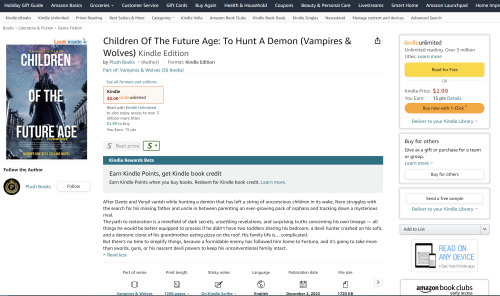
(And they weren't even creative with their cover design. If you're going to pirate something that I spent a full year of my life writing, at least give me a pretty screenshot to brag about later. Seriously.)
I promptly filed a DMCA complaint to have it removed, but I checked out the company that put it up -- Plush Books -- and it looks like A LOT of their books are pirated fic. They are by no means the only ones doing this, either -- the fact that """publishers""" can download stories from AO3 in ebook format and then reupload them to Amazon in just a few clicks makes fic piracy a common problem. There are a whole host of reasons why letting this continue is bad -- including actual legal risk to fanfiction archives -- but basically:
IF YOU ARE A FANFIC AUTHOR WITH LONG AND/OR POPULAR WORKS, PLEASE CHECK AMAZON TO SEE IF YOUR STORIES HAVE BEEN PIRATED.
You can search for your fics by title, or by text from the description (which is often just copied wholesale from AO3 as well). If you find that someone has stolen your work and is selling it as their own, you can lodge a DMCA complaint (Amazon.com/USA site; other countries have different systems). If you haven't done this before, it's easy! Here's a tutorial:
HOW TO FILE A COPYRIGHT COMPLAINT FOR STOLEN WORK ON AMAZON.COM:
First, go to this form. You'll need to be signed into your Amazon account.
Select the radio buttons/dropdown options (shown below) to indicate that you are the legal Rights Owner, you have a copyright concern, and it is about a pirated product.
Enter the name of your story in the Name of Brand field.
In the Link to the Copyrighted Work box, enter a link to the story on AO3 or whatever site your work is posted on.
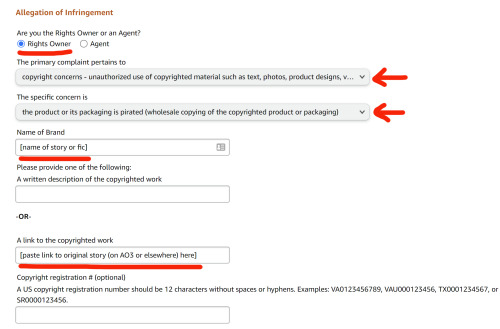
In the Additional Information box, explain that you are the author of the work and it is being sold without your permission. That's all you really need. If you want, you can include additional information that might be helpful in establishing the validity of your claim, but you don't have to go into great detail. You can simply write something like this:
I am the author of this work, which is being sold by [publisher] without my permission. I originally published this story in [date/year] on [name of site], and have provided a link to the original above. On request, I can provide documentation proving that I am the owner of the account that originally posted this story.
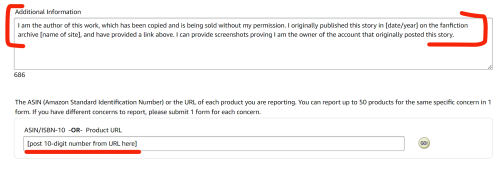
In the ASIN/ISBN-10 field, copy and paste the ID number from the pirated copy's URL. You'll find this ten-digit number in the Amazon URL after the word "product," as in the screenshot below. (If the URL extends beyond this number, you can ignore everything from the question mark on.) Once this number has been added, Amazon will pull the product information automatically and add it to the complaint form, so you can check the listing title and make sure it's correct.
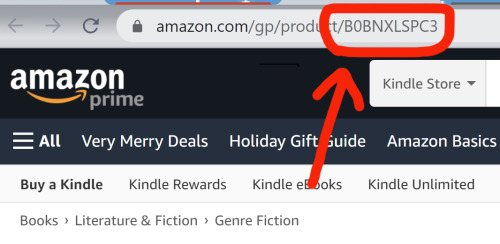
Finally, add your contact information to the relevant fields, check the "I have read and accept the statements" box, and then click Submit. You should receive an email confirmation that Amazon has received the form.
Please share this information with your writer friends, keep an eye out for/report pirated works, and help us keep fanfiction free and legally protected!
NOTE: All of the above also applies to Amazon products featuring stolen artwork, etc., so fan artists should check too!
-
 darknerdofthesith liked this · 6 months ago
darknerdofthesith liked this · 6 months ago -
 notactually-nugg liked this · 7 months ago
notactually-nugg liked this · 7 months ago -
 carrot-quiche liked this · 8 months ago
carrot-quiche liked this · 8 months ago -
 fungusamongus93828 liked this · 8 months ago
fungusamongus93828 liked this · 8 months ago -
 catwolfsworld liked this · 8 months ago
catwolfsworld liked this · 8 months ago -
 legalize-arson liked this · 8 months ago
legalize-arson liked this · 8 months ago -
 lavendertoonz reblogged this · 8 months ago
lavendertoonz reblogged this · 8 months ago -
 lavendertoonz liked this · 8 months ago
lavendertoonz liked this · 8 months ago -
 redhhound liked this · 8 months ago
redhhound liked this · 8 months ago -
 alexsinner3 liked this · 8 months ago
alexsinner3 liked this · 8 months ago -
 jcryptid reblogged this · 8 months ago
jcryptid reblogged this · 8 months ago

Sometimes i draw shit, sometimes i write shit, sometimes both at the same time.♠ Aro/Ace, (They/Them), Chaotic Good Disaster, definitely a human person
226 posts